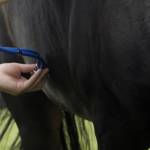Colic in Horses: Just the Basics

Widely defined as any abdominal pain in horses, colic may be caused by problems in the foregut, hindgut, bile ducts, or urinary tract. In practice, however, colic is usually associated with and caused by gastrointestinal distress. Pain usually results from distension of some part of the gut with gas, fluid, or a combination of both.
Obstruction of the gut is classified as either strangulating (twisted intestine) or nonstrangulating (impactions or dried gut contents that block the intestine). Horses with small intestinal colic usually show more severe and continuous signs of pain than when the large intestine is affected.
The veterinarian uses experience, physical examination, and rectal palpation findings to decide treatment options, including the potential for surgery. The most important indication that a horse will require surgery to resolve colic is the inability to control pain despite appropriate medical therapy. The large majority of colic cases examined on the farm will respond to routine medical therapy, such as use of analgesics, antispasmodics, and laxatives.








